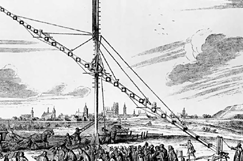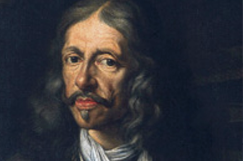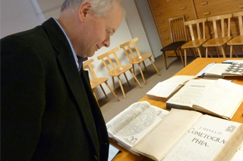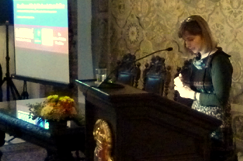Editing the Correspondence of Johannes Hevelius
Tags: Astronomy, Editions, Europe, History of Science, Johannes Hevelius, Networks, Seventeenth Century, Theft
On 26 September 1679, while the astronomer Johannes Hevelius and his wife Elizabetha were spending a relaxing evening in gardens outside the gates of their home city of Danzig (Gdańsk), fire consumed their house in the old town. A large part of their possessions, books, personal manuscripts, and instruments, was destroyed; by the following morning the observatory which Hevelius had carefully erected on the roof of the house lay in ruins.
Much was irretrievably lost, but remarkably the letters he had exchanged with the learned men and women of Europe, including Kepler, Boulliau, Gassendi, Christiaan Huygens, Oldenburg, Wallis, and Kircher, together with his treasured collection of Kepler manuscripts, survived. At that time comprising thirteen volumes, the correspondence of Hevelius constitutes one of the great resources for the study and appreciation of early modern scientific networks.

Hevelius’s 45m focal-length telescope.

Johannes Hevelius.
Making this extraordinarily rich corpus available to the wider scholarly community is the task of a major collaborative editorial project currently underway in France, Germany, and Poland, of which I am pleased to be serving on the advisory committee. With most of the over 2,700 surviving letters now housed in collections at the BNF and the Bibliothèque de l’Observatoire in Paris, it was particularly fitting that the director of the French team Professor Chantal Grell (University of Versailles) – accompanied by Professor Robert Halleux (University of Liège) – should inform our third seminar series of the background and methodologies of this ambitious enterprise on Thursday 10 May. In a talk entitled ‘Editing the Correspondence of Johannes Hevelius: Networks, Themes, and Methodological Challenges’, Chantal first provided an overview of Hevelius’s life and letters, before giving a lively account of the complex archival afterlives of the astronomer’s epistolary collection following his death in 1687, including details of the letters famously purloined by Guillaume Libri in the mid-nineteenth century. Following a conspectus of Hevelius’s many correspondents, Chantal concluded with an analysis of the exemplary seventeenth-century scientific exchange between Hevelius and Pierre de Noyers, the secretary to the Queen of Poland. Following an interesting question and answer session – which included, inter alia, discussion of the benefits and challenges of balancing hard copy and digital outputs within large-scale correspondence projects – the evening came to fitting conclusion with a visit to the opening of the Renaissance in Astronomy exhibition at the Museum of the History of Science.




 Join
Join 